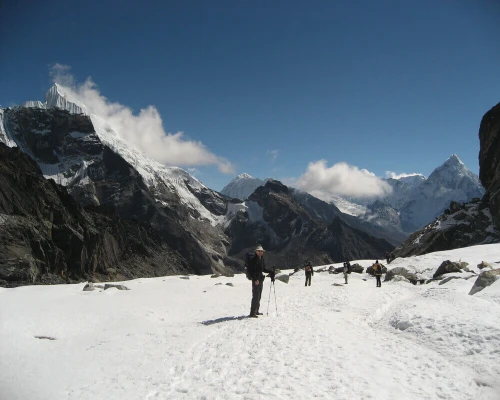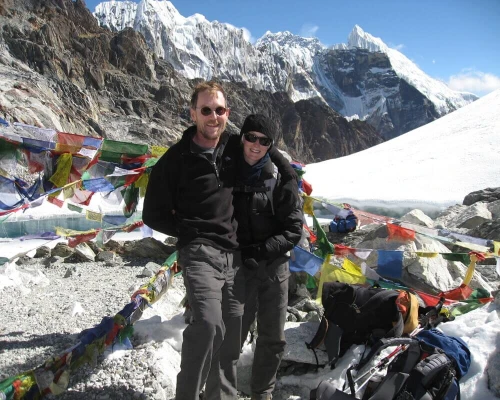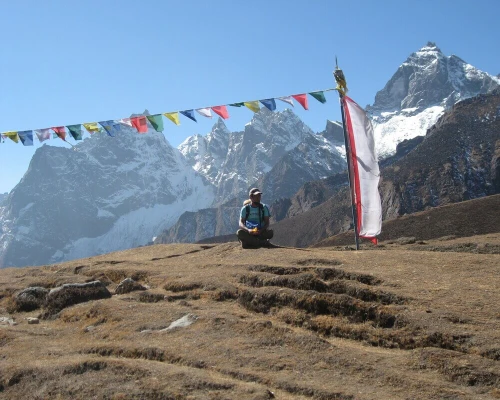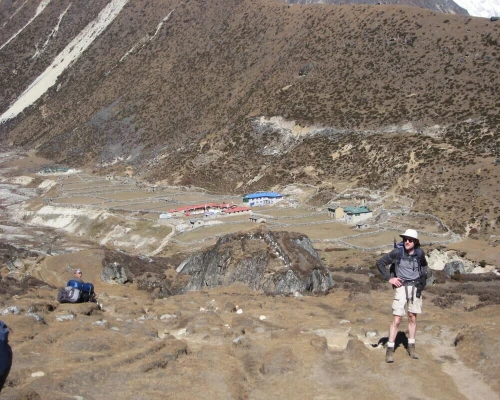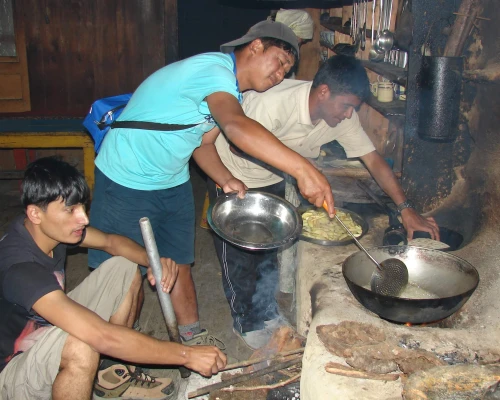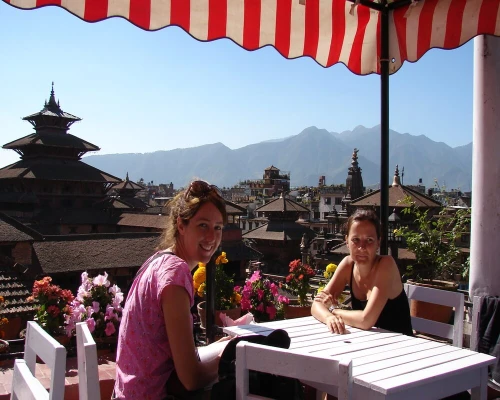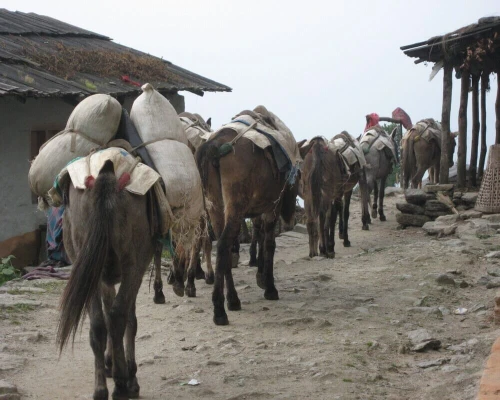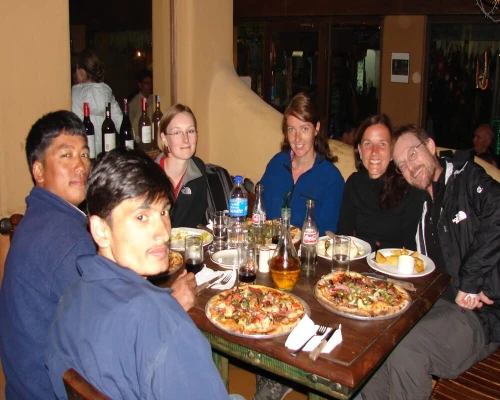Jiri to Everest Base Camp trek is indeed a wonderful and serene journey that takes you through the heavenly trails of Everest. This trekking route holds historical significance as it was more commonly used in the past compared to the present. Embarking on this traditional trekking route allows you to experience the charm and tranquility that trekkers of olden times enjoyed. The Jiri to Everest Base Camp trek is a 22 day adventure that covers an altitude range of 300m to 5,643m. The trek starts in the picturesque town of Jiri and gradually ascends towards the iconic Everest Base Camp. Along the way, you'll be captivated by the breathtaking views of the surrounding landscapes, including lush valleys, terraced fields, and dense forests. The trek is designed to provide you with a serene experience and create beautiful memories that last a lifetime.
As you make your way through the route, you'll have ample opportunities to immerse yourself in the natural beauty of the Everest region. The ever-evolving Jiri to Everest Trek itinerary ensures that you witness the diverse landscapes and experience the gradual transition from lower altitudes to higher altitudes. While the journey offers serenity and beauty, it's important to note that the Jiri to Everest Base Camp trek can be physically challenging at times. As you ascend higher into the region, the altitude gain and rugged terrains may test your physical abilities. It's crucial to be well-prepared, physically fit, and mentally determined to overcome these challenges and enjoy the trek to the fullest. The Jiri to Everest Trek package for 2023 provides a well-planned itinerary that ensures a balanced and rewarding experience. Along with the physical challenges, you'll also have opportunities to interact with the local Sherpa communities, visit monasteries, and immerse yourself in the unique Himalayan culture. Overall, the Jiri to Everest Base Camp trek is an incredible journey that allows you to explore the beauty of the Everest region while following in the footsteps of trekkers from the past. It's a chance to connect with nature, challenge yourself, and create cherished memories that will stay with you forever.
Embark on the Jiri Everest Trekking journey and find tranquility in the off-beaten paths leading to Everest Base Camp. Explore the hidden gems of the region, including breathtaking passes and serene lakes, as you immerse yourself in this off-the-beaten-path adventure.
- Trekking in the Himalayas is an awe-inspiring adventure that offers breathtaking views and an opportunity to immerse yourself in the rich cultural heritage of the region. The Jiri to Everest Base Camp trek is particularly renowned for its challenging yet rewarding nature.
- As you embark on the Jiri to Everest Base Camp trek, you'll witness jaw-dropping views of the majestic Himalayan peaks, including Mount Everest, the highest mountain in the world. The landscapes you encounter along the way are truly astounding, ranging from lush alpine forests to rugged and arid highlands. The trek takes you through various terrains, encompassing both uphill and downhill sections that test your physical endurance and provide an exhilarating experience.
- One of the highlights of the Jiri to Everest Base Camp trek is the opportunity to interact with the local Himalayan people. The region is primarily inhabited by the Sherpa community, known for its resilience, warmth, and rich cultural traditions. You'll have a chance to learn about their religion, which is predominantly Buddhism, and observe their customs and traditions firsthand. The Buddhist monasteries that dot the landscape offer a serene and spiritual atmosphere, allowing you to gain insight into the local way of life.
- Throughout the trek, you'll pass through authentic Sherpa villages, where you can witness the simplicity and harmony of the Himalayan lifestyle. Interacting with the locals will give you a deeper understanding of their daily routines, traditional practices, and warm hospitality. It's an opportunity to connect with a culture deeply rooted in the mountains and to appreciate the resilience and strength of the Himalayan people.
- The Jiri to Everest Base Camp trek is a challenging adventure that requires physical fitness and mental determination. However, the stunning views, cultural immersion, and personal growth make it a truly rewarding experience. Whether you're a seasoned trekker or a first-time adventurer, the journey through the Himalayas will leave you with memories that last a lifetime.
Overview of Everest Kalapatthar Trek
The Everest Kalapatthar Trek takes you through majestic Himalayan destinations above 5000 meters, offering a unique and challenging adventure. Along the way, you'll have the opportunity to explore iconic landmarks such as the Kongma La pass 5540 meters, the summit of Kala Patthar at 5,643 meters, and the breathtaking Gokyo Peak 5,357 meters. These lesser-visited valleys near Chukhung provide a thrilling experience for bold and brave trekkers.
As you traverse the trails, you'll be mesmerized by the awe-inspiring views of the Himalayan peaks. The majestic mountains, including Mt. Ama Dablam at 6,812 meters, Mt. Everest at 8,848 meters, Mt. Lhotse at 8,526 meters, and Mt. Pumori at 7,161 meters, will leave you spellbound. This trek offers an alternative way to experience the beauty of Everest Base Camp, similar to the renowned Everest Base Camp Trekking adventure.
For those seeking even more excitement, the adventure can be extended by connecting with Island Peak Climbing from Chhukung. This adds an extra layer of thrill and challenges to your Jiri Everest Hiking itinerary. Whether you're an experienced trekker or a passionate enthusiast, this journey promises unforgettable views, exhilarating experiences, and a deep connection with the stunning landscapes of the Everest region.
Jiri to Everest Base Camp Trek Route
As the path to Everest unfolds, the Chhukung and Everest Base Camp at 5,380m become the main objectives for trekkers. The mesmerizing Chhukung can be explored through the thrilling adventure of Dingboche. This hike takes you to Kala Patthar and the base camp, crossing the challenging Kongma La pass at an alititude 5540 meters. It is a trek recommended for experienced trekkers who possess great dedication and fitness.
The Jiri to Everest Base Camp Trek truly tests your physical abilities as you ascend higher into the region. However, it rewards you with incredible experiences and breathtaking views. Along the way, you'll have numerous opportunities to explore the unique villages in the area at a slower pace. One such village is Chaurikharka, which is accessed through a jungle that proudly serves as a habitat for monkeys.
This trek is not only a test of endurance but also a journey that allows you to immerse yourself in the natural beauty and cultural richness of the region. It's a chance to witness stunning landscapes, encounter friendly Sherpa communities, and create lifelong memories in the heart of the Himalayas.
Jiri to Everest Base Camp Trek Season
The Jiri to Everest Base Camp Trek is typically conducted during the best seasons for trekking in the Everest region, which is spring and autumn. During these seasons, you'll have favorable weather conditions and clear skies, allowing for stunning views of the surrounding landscapes.
As you embark on the journey, you'll traverse through various grasslands where yaks can often be spotted grazing peacefully. The undulating terrain will present you with both ups and downs, but the fatigue will fade away as you enter the enchanting forests adorned with rhododendrons, pines, conifers, and oaks. These lush forests add a touch of magic to your trekking experience.
The adventure reaches its pinnacle as you begin crossing the passes above 5,420 meters. These high-altitude passes offer breathtaking panoramic views of the awe-inspiring landscapes and majestic peaks. The sight of the surrounding valleys and towering mountains will leave you in awe.
While the Jiri to Everest Base Camp Trek can be conducted in summer and winter as well, the experience may vary from the spring and autumn seasons. Spring brings blooming flowers and lush greenery, while autumn offers clear skies and vibrant landscapes. Summer and winter may have different weather conditions and challenges, but they can still provide unique and rewarding experiences for those seeking adventure. Overall, the best time to undertake the Jiri to Everest Base Camp Trek is during the spring and autumn seasons, as they offer optimal weather conditions and maximize the beauty of the Himalayan region.
Jiri to Everest Base Camp Trek Difficulty
Jiri Everest Trekking is essentially the Everest Base Camp Trek starting from Jiri. This trek takes you all the way up to an elevation of 5,643 meters, which is a considerable height and requires physical strength and mental preparation. As such, Jiri Everest Trekking can be considered a challenging and demanding trek that extends for over 22 days.
While previous trekking experience is not a requirement, it is important to note that the difficulty level of the Jiri Everest Trek is moderate. This means that it does require a certain level of stamina, physical strength, and dedication to complete the trek successfully. The terrain, altitude gain, and rugged paths can pose challenges, and it's crucial to be well-prepared both physically and mentally.
With the right level of fitness, proper acclimatization, and a positive mindset, you can undertake the Jiri Everest Trek and overcome the challenges gracefully. The journey will test your limits, but it also offers an incredible opportunity to explore the majestic landscapes of the Everest region, witness stunning views, and experience the unique Sherpa culture along the way. By embracing the physical demands and being prepared for the trek, you can make the most of this remarkable adventure and create lasting memories in the heart of the Himalayas.
Why Nepal Nomad
Nepal Nomad, with over twenty-five years of experience, is dedicated to providing exceptional adventure experiences to nomads like you. Our team consists of highly experienced mountaineers, knowledgeable guides proficient in map-reading, and staff trained in first-aid and evacuation procedures, ensuring your satisfaction, safety, and security. We prioritize catering to your individual preferences and comfort levels, operating at a pace that suits you best. Your well-being is of utmost importance to us.
Our goal as a service provider is to deliver the best possible experience for your Jiri to Everest Base Camp trip. Our carefully designed itineraries strike a balance between adventure, exploration, and relaxation. However, we are more than willing to create a tailor-made departure exclusively for you, taking into account your specific preferences and requirements. Our aim is to ensure that your journey aligns perfectly with your expectations and desires.
Our team is readily available to assist you with any travel-related information or queries you may have. We are here to support you throughout the planning process, providing guidance and assistance whenever needed. Your satisfaction and enjoyment are our top priorities. Join Nepal Nomad now and embark on an extraordinary adventure from Jiri to Everest Base Camp. Let us take care of the details and ensure an unforgettable experience for you.



